Understanding Google My Business & Local Search
Knowledge Panel – Down the Hotel Rabbit Hole with Google
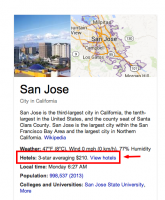 Google is leaving no stone unturned in their effort to find new ways to 1)show ads and 2)redirect users back to Google properties to see those ads.
Google is leaving no stone unturned in their effort to find new ways to 1)show ads and 2)redirect users back to Google properties to see those ads.
Brad Brewer of Brewer Digital Marketing originally shared this screen shot on G+ showing the addition of a link to Google’s hotel search from the Knowledge Panel on geographic city based searches.
This link of course returns an ad laden search result which takes you to the Google Hotel Local Stack, which if you click takes you to the Google Hotel Booking Page which if you click takes you to a Branded Search Knowledge Panel Booking page for a given hotel.
Talk about going down the Google rabbit hole… not a web link to be seen through most of this process except of course back to Google or to an ad. I think that the engineers at Google have in fact been reading Alice in Wonderland:
“Would you tell me, please, which way I ought to go from here?”
“That depends a good deal on where you want to get to.”
“I don’t much care where –”
“Then it doesn’t matter which way you go.”
― Lewis Carroll, Alice in Wonderland
“As long as it’s back to Google”
– Larry Page
Google’s new motto: “What good is knowledge and all those facts if they can’t be monetized?”
Imagine some of the possibilities. Google could sell Disney tickets ads on the SeaWorld KP, they could sell t-shirt ads on the Bono one and heck maybe they could entice a Canadian pharmacy to sell drugs on the Knowledge Panel for US insurance companies. The possibilities are endless.
Start with a search for any big city (San Jose in this case):
Here is a tour of where you go once you click that link:
….. First Stop: you will be taken to this page where you can click on an ad or the Local Stack where not a link or phone number is to be seen (except of course in the ads): —>
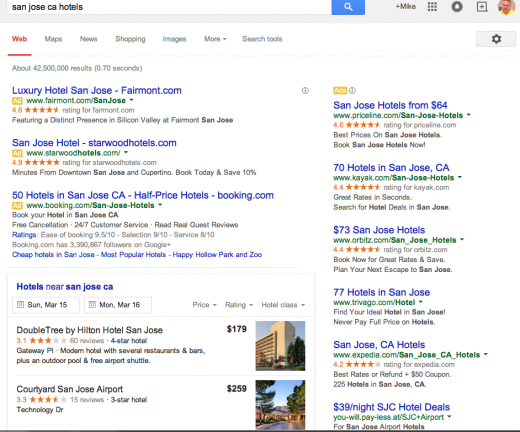
….Second Stop: If you think you will find a link or phone number here you are mistaken… (goto Jail, go directly to Jail, do not pass go – sorry for mixing metaphors) —>
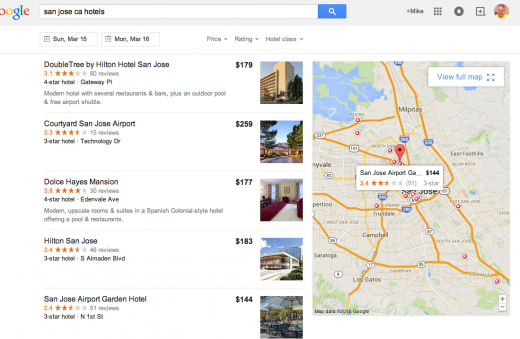
…..Ah, finally (last stop) a phone number and a web link…. although not quite as prominent as the booking tool….—>
© Copyright 2025 - MIKE BLUMENTHAL, ALL RIGHT RESERVED.
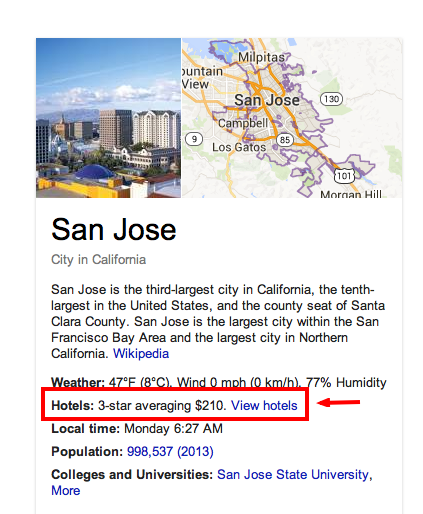
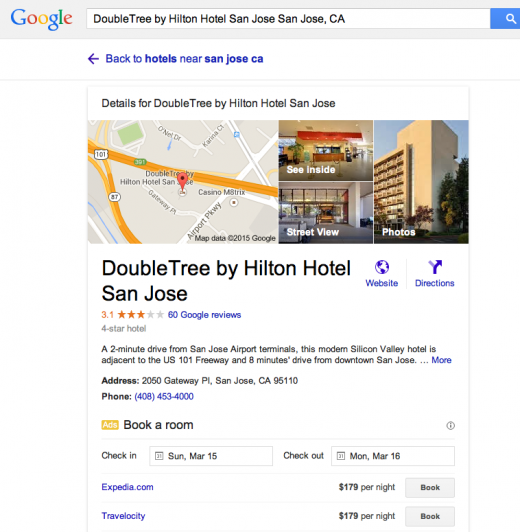
Comments
8 Comments
Gotta love Google’s persistence at finding ways to monetize – I’d love to be on that Team; it would be a blast
Between this, and Expedia buying Travelocity and then buying Orbitz (in addition to the masses of other big travel sites they already owned), we’re headed towards monopolies in the travel business: Google owning travel booking from a search standpoint (oh, and they own ITA software which powers the reservations systems of many airlines and travel sites), and Expedia et al owning travel booking from a branded travel search perspective (Expedia, Travelocity, Hotels.com, Hotwire, Orbitz…it’s all one company now). This can’t be good for consumers, nor for suppliers like the hotels and airlines.
@Andy
No stone unturned. Next stop: Watch this ad BEFORE you can search.
@Michael
The reality of unbridled capitalism is the “natural” forming of oligopolies and monopolies. Its the dream of everyone of these companies to become just that so that they can more easily protect their business.
I suppose at least Expedia NO LONGER owns TripAdvisor (who owns: Airfarewatchdog, BookingBuddy, Cruise Critic, Family Vacation Critic, FlipKey, GateGuru, Holiday Lettings, Holiday Watchdog, Independent Traveler, lafourchette, OneTime, SeatGuru, SmarterTravel, Tingo, Jetsetter, Travel Library, TravelPod, Viator, VirtualTourist, WanderFly, Where I’ve Been, SeatMe, and Kuxun.cn). Expedia spun them off in December 2011.
Just think of the fun aggregators and comparison engines will be having with this…
Other funny think about the evolution of travel… Expedia sold TripAdvisor which was after Expedia was first sold off from Microsoft… Damn MS made some bad decisions…
Indeed with Facebook leaving no stone unturned, even at the cost of organic reach, then why the grand dad of internet would be left behind?
From a pc go to google.co.uk and search for either hotels or restaurants in any city in Great Britain. The results are dramatically different and dramatically more user friendly.
A map, an address, a phone number, and plenty of links. Its helpful and user friendly information. Completely different than the results in the US. Of course there could be many reasons for this. I’d suggest that the EU is all over google’s “arse”, unlike in the US, and consequently Google is loathe to put out such unhelpful, non informative results.
Search phrases such as “restaurant/city name” are among the most plentiful search phrases in the States. Likewise “hotels/city name”.
I’d suggest using bing’s results for either. Much better information. If you wish to book a hotel or use an Internet travel agent site to compare prices its all there. If you wish to go to the hotel’s site its there. If you wish to see where a hotel and hotels are located within the city its all there.
For a restaurant search in the US I’d use yelp. Excellent quality of information.
I would suggest not using google. The results stink; the presentation is offensive, at the least, terribly arrogant, and completely user unfriendly.
Google gained its monopoly status in search for giving the best quality information. Now its information in these categories is the worst possible information. Its deliberate. Meanwhile there are many better alternatives.
Anyway, Mike, nice writing on this topic. Its very grotesque. I wonder if any other writers in the SEO world will pick up on the same perspective.
At this point I doubt it.
Lets be clear. Mobile usage may be greater than desktops, but this technology includes Pads and smart phones with large screens.
I personally prefer to look a normal websites with my phone using my fingers to enlarge the fonts and buttons etc.
But as briefly suggested above, commercial reason seem to drive the layout, rather than non biased useful information. Why should Google assume if I am looking for information on a city, that I want to rent a room?
Anyway history has shown that Google constantly tries new things then drops them just as quick.
Comments for this post are closed.